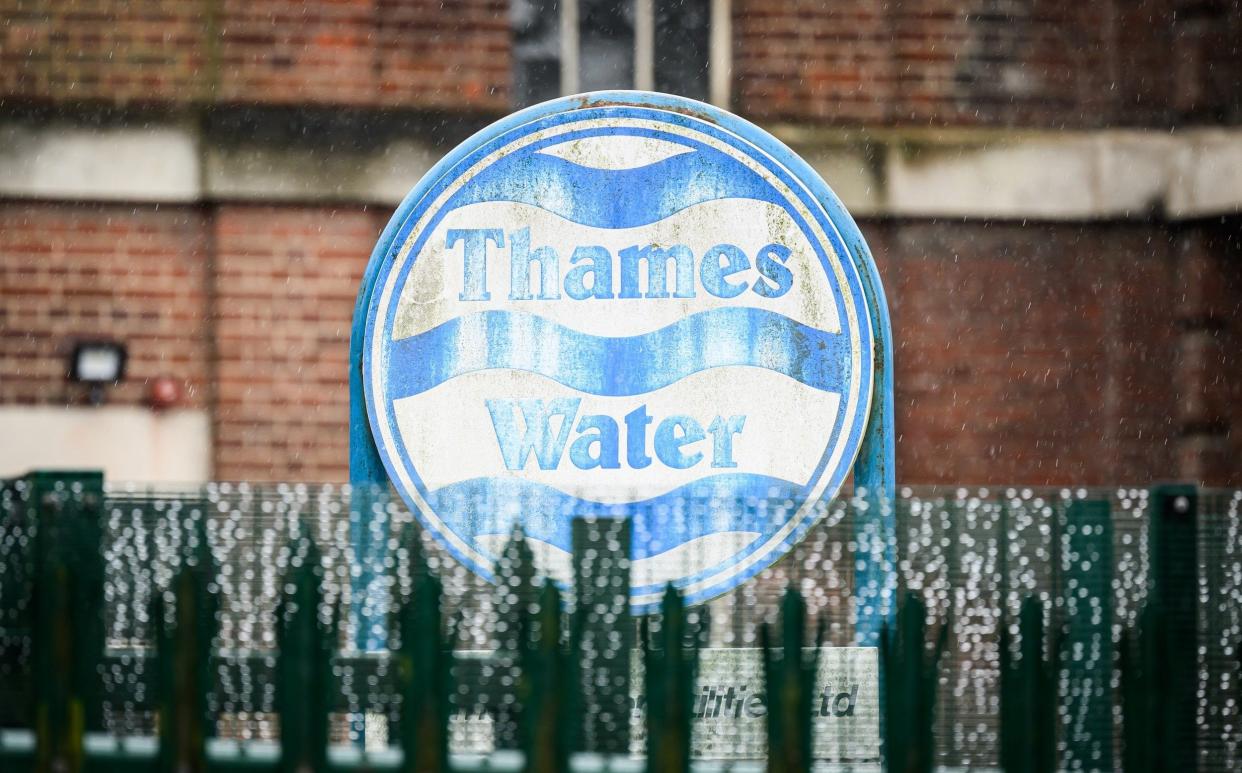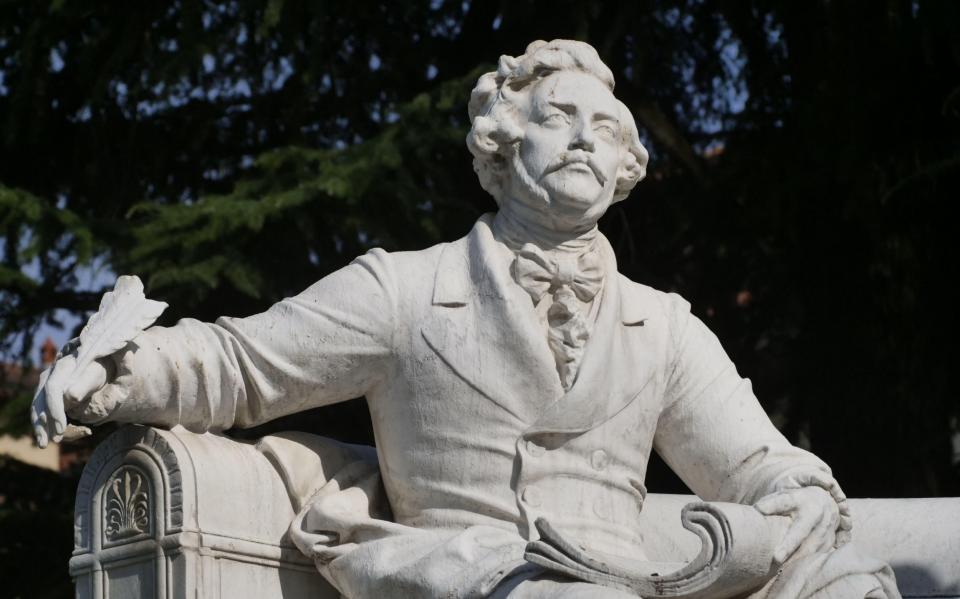Letters: Thames Water should suffer the consequences of its poor performance

SIR – Thames Water (Comment, April 1) has been rebuked by Michael Gove, the Levelling Up Secretary, for asking to increase water bills by 40 per cent.
Yet it has already increased my water bill by 75 per cent since February, regardless of the fact that the countryside is now saturated (there is never any real shortage of water in this area) and even though there has been no reduction in the discharge of sewage into rivers.
It needs to be allowed to go bust.
C M Chadwick
Lechlade, Gloucestershire
SIR – Nick Timothy (Comment, April 1) is right to draw attention to the part played by Macquarie in the current financial distress of Thames Water. The mountain of debt on its balance sheet and the sewage in some of our rivers are its legacy.
But readers may not be aware that Macquarie has now turned its attention to acquiring large tracts of agricultural farmland for the purpose of “solar parks”. A recently announced project in North Wiltshire is not far from large industrial developments that have no solar panels on them. Green energy is important, but another unwelcome legacy from Macquarie can be avoided if the Government reviews its guidelines on the location of solar panels.
Andrew Sells
Chairman, Natural England, 2014-2019
Sopworth, Wiltshire
SIR – The efforts to reduce water usage seem very feeble compared to those encouraging us to use less energy, whereas the gains would be immense.
The smart meter programme has been a very expensive failure; water meters would have been a far better option, and brought an immediate drop in consumption. Do we really need all this obsessive showering and clothes washing? I never shower, wash daily with a basin of water and have the occasional bath. I still have friends.
Saving water is more effective than threatening water bosses with fines or jail sentences.
Timothy Schofield
Chester
SIR – According to my water meter, in three days in January I used the equivalent of two months’ consumption, with usage returning to normal levels thereafter. There is no sign of a leak and I don’t have a swimming pool. I have raised this with Thames Water, which says it is investigating, but that hasn’t stopped it sending me a bill including the very questionable consumption figures.
Harry Mann
Teddington, Middlesex
SIR – Regardless of the industry they operate in, regulators such as Ofwat are either too incompetent or lack the required skills to do their job. They simply ignore customers and pander to the needs of companies.
Mike Metcalfe
Butleigh, Somerset
Migrant boat crossings
SIR – It beggars belief that, during the first quarter of this year, when the water is generally very cold and rough, more immigrants than ever have managed to make it across the Channel (report, April 1).
Could someone explain why Border Force vessels and others pick up these desperate people and ship them to the Kent coast, when surely they should be returning them to the French beaches they came from?
Nigel Tollit
King’s Lynn, Norfolk
SIR – Last year Rishi Sunak was on television frequently claiming that his policies had got Channel crossings down by a third. Can he please now explain why we have record numbers in the first three months of this year?
Keith Jacques
Stafford
Landline switchover
SIR – News that the digital landline switchover has been delayed (report, April 1) is long overdue. Large parts of the countryside have either weak or no mobile phone signal. Last year BT cut my copper landline without my consent, despite my pointing out that I do not have enough signal to reliably call 999 in the event of a power cut.
My MP wrote to BT on my behalf, and BT told him that I have an “excellent signal” and that as I am “able-bodied” I would have no problem ringing emergency services. What is BT expecting me to do in an emergency? Should I run round the garden waving my phone while the house is on fire, if I have a heart attack or am confronted by a burglar?
The truth is that the Government abrogated responsibility for this and, yet again, has ignored the countryside. It is only a matter of time before a major power outage leaves many vulnerable people without the means to call emergency services.
Who will be held responsible at the subsequent public inquiry?
Tristram C Llewellyn Jones
Church Stretton, Shropshire
The BBC’s dark clouds
SIR – I was not at all surprised to read that BBC weather forecasts favour pessimism (“At last, the BBC admits to being biased – if only on the weather”, Comment, April 1).
Anyone who has both the BBC and Met Office weather apps on their phone will have seen the differences daily, with Met Office white clouds being countered by the black clouds of the BBC.
Relying on the latter would have resulted in many missed walks and increased electricity bills from unnecessary use of the tumble dryer.
Ian Fitter
Helston, Cornwall
Healthy Hoover
SIR – Regarding the lifespan of electrical appliances (Letters, April 1), I’m still using a Hoover Junior vacuum cleaner that my mother bought in 1956.
Apart from a new rubber drive band for the motor, it works just fine.
Stephen Woodbridge-Smith
Tavistock, Devon
SIR – I read that the average life of a deep freezer is 11 years. Mine is 50-plus and has moved house twice. Still going strong.
Sue Elsey
Leppington, North Yorkshire
SIR – I bought my microwave in 1987. It moved with me to France in 2001, had its plug changed and is still in daily use.
Anna Burns
St-Maximin-la-Ste-Baume, Var, France
Labour prisons policy
SIR – Emily Thornberry, the shadow attorney general, has said that Labour will match the Tories on spending £4 billion on building new jails to tackle the prison overcrowding crisis (report, telegraph.co.uk, March 22). This just shows that Labour has no fresh ideas about how to fix Britain’s prisons.
A good example is the perennial crisis with sentences of Imprisonment for Public Protection (IPP). Today there are 2,852 IPP prisoners, 99 per cent of whom are beyond their original prison terms. More than 700 are 10 years or more beyond their original terms. Almost 100 IPP prisoners are known to have committed suicide since IPP was brought in by New Labour in 2003.
Labour has promised nothing on IPP because it would rather let these people rot in prison than put resources into a review of all their sentences and restore justice. You’d think, with a lawyer at its head, that the party would want to commit to restoring justice for IPP victims, not withhold it.
Acting on IPPs would distinguish Labour’s policy from that of the Tories, and show that it has the ideas and guts to tackle difficult issues head on.
Henry Rossi
Bristol
TV licence threats
SIR – Bev Gray (Letters, March 29) should not worry too much about the television licence authorities visiting his home to prosecute him. They have no right of access to his property.
Some years ago, after being plagued by threatening letters about an empty property, I wrote a formal letter to TV Licensing, saying that I was banning anyone from that organisation from ever setting foot on my property. I duly received a formal response acknowledging my ban.
Play them at their own game.
John Newbury
Warminster, Wiltshire
Top frass
SIR – Sarah Knapton reports (April 1) on the benefits of turning waste products into animal feed through using black soldier flies (BSF). Another benefit, which will interest gardeners, is that BSF manure, known as frass, is a fantastic fertiliser, with a macronutrient profile similar to chicken manure.
As an RHS Britain in Bloom village entry for 2024, we will be using frass on all the beds and barrels, and the schoolchildren of Norton-in-Hales will be conducting controlled trials on their raised beds.
Sarah Moulson
Norton-in-Hales, Shropshire
A composer to turn to for charming melodies

SIR – Congratulations to Gareth Malone on training a group of eight amateur singers to join the BBC Singers in an Easter performance of Bach’s St John Passion, which he conducted at Cardiff’s Hoddinott Hall (Television, telegraph.co.uk, March 31).
Extolling the virtues of the great composers is a joy, but once again I found Bach’s great work impenetrable. To me it is earnest and tuneless.
Looking for relief, I found attractive melodies to charm me in Donizetti’s Lucia di Lammermoor. No doubt my musical redemption is a distant prospect.
Ian France
Penrith, Cumbria
A first step towards nuclear energy security
SIR – The Prime Minister’s recognition of the need for a “national endeavour” to secure the future of the UK’s defence and civil nuclear industry is to be welcomed (Business, March 26).
The sheer scale and complexity of the dreadnought and warhead programmes, which will ensure our nation’s security from nuclear blackmail, are at the very limit of our technical and scientific capability. The developing Aukus submarine (SSN-A) programme adds to the complexity.
The realisation that only nuclear can meet the future massive growth in the UK’s base-load electrical demand means our civil nuclear programme is also crucial for national security. We require a vast increase in trained scientists, technicians and skilled workers, and the planned private investment of £763 million in skills, jobs and education that will support 40,000 new nuclear-related jobs is a good first step.
Admiral Lord west of Spithead (Lab)
London SW1
SIR – Recently I attended the international event in Barcelona to oppose the closure of Spain’s seven nuclear reactors. It was organised by Stand Up For Nuclear and Econucleares.
This policy has global implications, as it hinders efforts to tackle climate change, which affects us all. When nuclear plants are closed, fossil fuels such as coal and gas are burnt instead, increasing the emission of greenhouse gases. Germany showed the folly of closing nuclear plants, which resulted in increased carbon-dioxide emissions as it burnt more coal – and even deindustrialisation, as renewables fail to provide reliable energy.
If we are to tackle climate change, we will need far more of the clean, reliable energy that nuclear power plants are able to provide. What’s more, nuclear power requires far less land and resources than many renewable alternatives.
Mark Dawes
London E11
Letters to the Editor
We accept letters by email and post. Please include name, address, work and home telephone numbers.
ADDRESS: 111 Buckingham Palace Road, London, SW1W 0DT
EMAIL: dtletters@telegraph.co.uk
FOLLOW: Telegraph Letters on Twitter @LettersDesk
NEWSLETTER: sign up to receive Letters to the Editor here

